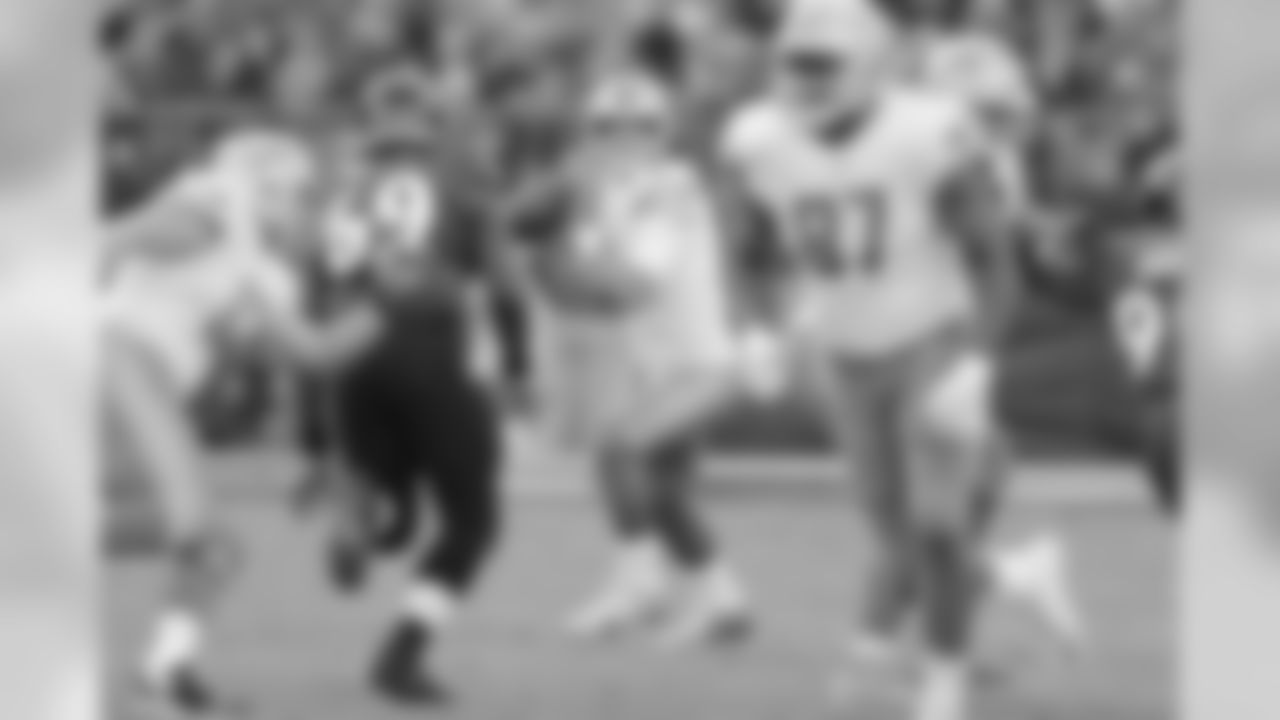Pictures of some of the Lions' top players.

WR Golden Tate

WR Golden Tate

WR Golden Tate

DE Ezekiel Ansah

DE Ezekiel Ansah

DE Ezekiel Ansah

QB Matthew Stafford

QB Matthew Stafford

QB Matthew Stafford

DE Anthony Zettel

DE Anthony Zettel

DE Anthony Zettel

LB Tahir Whitehead

LB Tahir Whitehead

LB Tahir Whitehead

WR Marvin Jones Jr.

WR Marvin Jones Jr.

WR Marvin Jones Jr.

S Glover Quin

S Glover Quin

S Glover Quin

RB Theo Riddick

RB Theo Riddick

RB Theo Riddick

CB Darius Slay

CB Darius Slay

CB Darius Slay

TE Eric Ebron

TE Eric Ebron

TE Eric Ebron
For most NFL teams, in most in-season weeks, Tuesday is the player's day off. It's a chance to rest, regroup and – win or lose the previous weekend – turn the page to the next opponent.
It's also a perfect time for us to discuss the hottest topics surrounding the Tampa Bay Buccaneers. And for that reason, the One Buc Mailbag is back! Every Tuesday, I'll be fielding a handful of questions from the fans, but you can send them in all throughout the week. The easiest way is to hit me up on Twitter (@ScottSBucs, using #BucsMailbag), but if 280 characters aren't quite enough to get your point across, you can also send an email to tbbsocial@buccaneers.nfl.com.
This week, we discuss the Bucs' overtime opportunities since the 2012 rule change that provided a possession to the second team if the first team kicked a field goal to start the extra period. We also look at some players who could get additional playing time down the stretch. Let's get to it.
1. Overtime Keep-Away
That is a great question, obviously prompted by the Buccaneers' overtime loss in Green Bay on Sunday. The Packers won the toss, elected to receive and scored a touchdown on the opening drive, thereby winning the game without the Buccaneers' offense – which was having a pretty good day – getting a chance to touch the ball. That was certainly frustrating.
For many years, that kind of outcome, with only one team getting a shot in overtime, was common and frustratingly dependent on something as uncontrollable as a coin flip. All a team had to do was get in position for a field goal on the opening possession and they could win without ever playing defense in overtime. In 2012, the NFL tried to address the inherent unfairness there by tweaking the rules so a field goal on the opening possession of overtime didn't end the game. In that case, the other team would get one possession with a chance to either match that field goal or win with a touchdown. The other two possibilities remained the same; that is, a first-possession touchdown still ended the game, and if the team with first possession didn't score the second team could win it with a score of its own.
There was an additional change made to the overtime rules this year, with the extra period shortened to 10 minutes, but Blizzard Kelly is clearly referring to the 2012 adjustment. He also correctly identifies three Buccaneer games since that 2012 change that have gone to overtime – at Minnesota in 2014, at Oakland in 2016 and Green Bay this past weekend.
However, he got one thing wrong: That Oakland overtime game did feature multiple possessions. In fact, that game went 13 minutes deep into overtime, four days before the Bucs had a Thursday night showdown with the high-flying Atlanta Falcons. The Buccaneers' fatigue from that extra-long Sunday game was clearly evident in the Thursday follow-up.
Oakland won the toss in that one and drove into field goal range but Sebastian Janikowski missed a 52-yard try. The Buccaneers failed to get a first down and punted. Oakland's next drive consumed more than five minutes off the clock but ended in a punt from around midfield, after which the Bucs again went three-and-out and punted. This time, starting at its own 40, the Raiders found a way to score, with Seth Roberts turning a short catch into a 41-yard touchdown.
So, in that case, the Buccaneers had not just one but two chances to score and win despite losing the coin toss. And, actually, while the Minnesota game Blizzard Kelly referenced was indeed over almost as soon as overtime began, the Bucs did have their chance. Tampa Bay actually won the coin toss and had the ball first, but on the opening play of overtime tight end Austin Seferian-Jenkins fumbled after a 10-yard catch and linebacker Anthony Barr returned it 27 yards for a touchdown. (For the record, the original questioner followed up his tweet with another one correcting his choice of the Minnesota game.)
Tampa Bay has now played a total of seven overtime games since the 2012 rule change. Here's how each one went down:
- Nov. 18, 2012 at Carolina: Buccaneers win the coin toss, win the game with a touchdown on the opening possession.
- Nov. 3, 2013 at Seattle: Buccaneers win the coin toss, punt on the opening possession, Seattle wins the game with a field goal.
- Oct. 5, 2014 at New Orleans: Saints win the coin toss, win the game with a touchdown on the opening possession.
- Oct. 26, 2014 vs. Minnesota: Buccaneers win the coin toss, Vikings win the game on a defensive touchdown on the opening possession.
- Nov. 1, 2015 at Atlanta: Buccaneers win the coin toss, score a field goal on the opening possession, win the game after stopping the Falcons' possession.
- Oct. 30, 2016 vs. Oakland: Raiders win the coin toss, Raiders win the game on a touchdown after each team had multiple possessions.
- Dec. 3, 2017 at Green Bay: Packers win the coin toss, win the game with a touchdown on the opening possession.
So the Buccaneers have actually won the coin toss four out of seven times since the new rules were adopted. They've won two of those games, although in one of they had to get a final stop on defense after kicking a field goal. Only twice have the opponents won the coin toss and won the game without Tampa Bay's offense ever touching the football.
If you ask me, the NCAA system, or something similar to that with matching possessions, is the way to go.
2. Scott:
I asked a question last week but didn't get it answered, so let's try again. I can actually ask mostly the same thing, except now that Jameis played in Green Bay we know that they weren't kidding when they said they were going to put him back in there when he was healthy. To be honest, I'm in the let's-not-get-him-hurt camp with the playoffs out of the picture, but I'm not that upset about it either way. So my question is, in addition to Jameis, who on the Bucs has a lot to prove over the last month of the season. Is the team going to try to get any more playing time for some guys in particular? I'd like to see more of O.J. Howard. Thanks,
Aaron Wiltz (via email totbbsocial@buccaneers.nfl.com)
I understand the point about Winston and these games probably not leading to a playoff berth, but you can put me in the he-needs-to-play boat. Hopefully our two boats can choose the civilized path and not blow each other up when the Joker loads our cargo holds with explosives.
I know we always use that "something to prove" phrase in situations like this, but I'm not sure it's the best way to look at it. I don't think there's anybody on the 2017 roster who is going to make or break his status for the 2018 roster over the next four weeks. However, there is something to be said for using those four games to give some exposure to players who haven't had much of it yet.
The thing is, there aren't a whole lot of players in that category. You bring up Howard, but he's been playing extensively since Game One. In fact, he easily has the most extensive playing time of all the Buccaneers' tight ends. The Buccaneers know what they have in Howard. Maybe the football finds him a little more frequently in the next few games, but that's not always in Tampa Bay's control, depending upon what the defense gives the offense. If you want to pick somebody from that tight end group, I'd go with fellow rookie Antony Auclair, and that process has already begun. Auclair had just one snap in the first nine games but has 41 over the past three and he got his first catch on Sunday in Green Bay.
You're probably going to be seeing a lot more of Peyton Barber in the weeks ahead after his breakout game against the Packers, even when Doug Martin returns from his concussion. Barber might be the one to whom that "something to prove" thought is most applicable. Was his 100-yard game in Green Bay fluky, or can he provide those types of results on a regular basis? We can't know that in just four more games but we can get some additional evidence. Rookie WR Bobo Wilson, just promoted from the practice squad, has a lot of pass-catchers in front of him but could get a shot in the return game at some point.
I don't believe the Buccaneers will make any special effort to get extra playing time for such inexperienced offensive linemen as Leonard Wester or Mike Liedtke, but they are only an injury or two away from having to do so by necessity. On defense, the Bucs are already using most of the players they have active on game day. The exceptions would be cornerbacks Deji Olatoye and Javien Elliott and just-promoted defensive end Patrick O'Connor. I wouldn't expect a concerted effort to get any of those three more involved, but they could find a bit of playing time down the stretch.
































